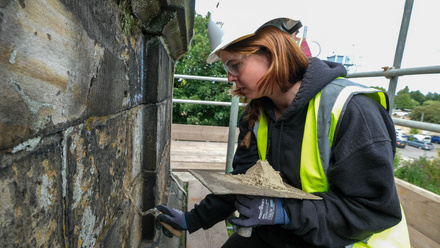Historic Environment Skills and Careers Action Plan for England launched
The report marks the culmination of 18 months of research and intelligence gathering across the sector, coordinated through the Historic Environment Skills Forum.
The Skills Forum, which brings together over 170 members from across the sector, is chaired by Historic England and supported by a wide range of stakeholders. One founding member, DBR (London) Limited (DBR), a UK conservation construction contractor, made a significant contribution, drawing on its own knowledge and experience of skills shortages and recruitment challenges to shape the final report.
HESCAPE identifies priority actions to guide long-term skill development in the sector. It follows the publication of Historic England’s Skills Needs Analysis report, which found the UK is headed towards a skills crisis that threatens the longevity of its heritage if action is not taken. The focus of the Plan for this period includes:
- Enhancing retrofit training to better reflect heritage
- Securing resources for career entry opportunities
- Piloting a shared apprenticeship program for heritage
- Embedding heritage into mainstream education courses
HESCAPE also emphasises key skills that face immediate challenges due to gaps and shortages, such as:
- Climate change adaptation skills (retrofit)
- Plastering and carpentry/joinery skills (for traditional buildings)
- Post-excavation specialist skills (archaeology)
- Industrial heritage conservation skills
- Skills to manage change in the historic environment (heritage planning)
The plan outlines a structured approach to addressing these skill challenges, with a delivery framework managed by newly formed Working Groups reporting to the Skills Forum Steering Group. DBR will play an active role, continuing to support these efforts through its participation in these Working Groups and by driving key initiatives within the sector.
Adrian Attwood ACR, DBR’s Executive Director, said:
This work is vital to ensure we are building a resilient workforce with the right skills to meet both current and future demands. As the sector evolves, having a strategic approach like HESCAPE will help us address the key challenges head-on, ensuring that our workforce is equipped to safeguard and maintain England’s historic environment.
Phil Pollard, Heritage Career Pathways Manager at Historic England, and Chair of the Skills Forum said:
We are proud to be leading and supporting the heritage sector in addressing the skills challenge we face. Collaboration between business, professional bodies and national heritage organisations is vital for us to achieve real impact, and the HESCAPE action plan provides a prioritised strategy for delivering this.





